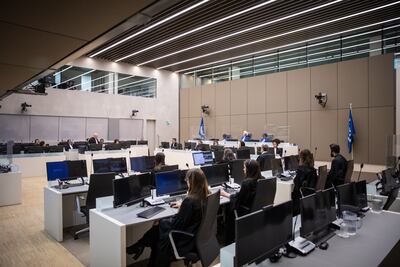Live updates: Follow the latest on Israel-Gaza
Israel was on Thursday given new hope of blocking arrest warrants issued by a war crimes court in The Hague against Prime Minister Benjamin Netanyahu and former defence minister Yoav Gallant.
Judges at the International Criminal Court say Israel can challenge its jurisdiction to try the allegations, with Mr Netanyahu's government arguing it has no right to take the case. "The court has no jurisdiction over Israel," Foreign Minister Gideon Saar said after the decision.
ICC prosecutor Karim Khan applied last May for arrest warrants against Mr Netanyahu, Mr Gallant and three senior Hamas figures who are all now dead. He alleges that the Israeli leadership used "starvation as a method of warfare" as part of the offensive in Gaza.
Pro-Israel lawyers have told the court that the country has "sole criminal jurisdiction" over its citizens in Palestine under the terms of the 1990s Oslo Accords. Others say that is irrelevant and that Palestine's membership in the ICC means judges can hear the case relating to Gaza.
ICC judges granted the warrants in November and dismissed Israel's appeal on jurisdiction. However, an appeals chamber ruled on Thursday that this was an "error of law", which "failed to sufficiently address Israel's argument" concerning the court's rules.
The appeal judges "remanded the matter to the pre-trial chamber for a new ruling on the substance of Israel’s challenge to the jurisdiction", a statement from the court said.
"On this topic, there is only one correct answer – the Court has no jurisdiction over Israel. The warrants were issued unlawfully. They are null and void," Mr Saar said.
Israel denies committing war crimes during its offensive in Gaza. Mr Netanyahu has avoided arrest by travelling to friendly countries such as Hungary and the US, which are not members of the court. Debate has raged in other nations such as Britain and Germany, torn between their sympathies with Israel and their commitments to upholding international law.
The ICC was set up in 2002 as the world's first permanent war crimes court, meant to replace one-off tribunals such as those that tried Nazi officials and Serb commanders during the Yugoslav wars. It has only ever convicted 11 people, none of them from western countries or their allies.
EPL's youngest
- Ethan Nwaneri (Arsenal)
15 years, 181 days old
- Max Dowman (Arsenal)
15 years, 235 days old
- Jeremy Monga (Leicester)
15 years, 271 days old
- Harvey Elliott (Fulham)
16 years, 30 days old
- Matthew Briggs (Fulham)
16 years, 68 days old
'Ghostbusters: From Beyond'
Director: Jason Reitman
Starring: Paul Rudd, Carrie Coon, Finn Wolfhard, Mckenna Grace
Rating: 2/5
UAE currency: the story behind the money in your pockets
The National's picks
4.35pm: Tilal Al Khalediah
5.10pm: Continous
5.45pm: Raging Torrent
6.20pm: West Acre
7pm: Flood Zone
7.40pm: Straight No Chaser
8.15pm: Romantic Warrior
8.50pm: Calandogan
9.30pm: Forever Young
Wicked: For Good
Director: Jon M Chu
Starring: Ariana Grande, Cynthia Erivo, Jonathan Bailey, Jeff Goldblum, Michelle Yeoh, Ethan Slater
Rating: 4/5
Groom and Two Brides
Director: Elie Semaan
Starring: Abdullah Boushehri, Laila Abdallah, Lulwa Almulla
Rating: 3/5
PROFILE OF STARZPLAY
Date started: 2014
Founders: Maaz Sheikh, Danny Bates
Based: Dubai, UAE
Sector: Entertainment/Streaming Video On Demand
Number of employees: 125
Investors/Investment amount: $125 million. Major investors include Starz/Lionsgate, State Street, SEQ and Delta Partners
((Disclaimer))
The Liechtensteinische Landesbank AG (“Bank”) assumes no liability or guarantee for the accuracy, balance, or completeness of the information in this publication. The content may change at any time due to given circumstances, and the Liechtensteinische Landesbank AG is under no obligation to update information once it has been published. This publication is intended for information purposes only and does not constitute an offer, a recommendation or an invitation by, or on behalf of, Liechtensteinische Landesbank (DIFC Branch), Liechtensteinische Landesbank AG, or any of its group affiliates to make any investments or obtain services. This publication has not been reviewed, disapproved or approved by the United Arab Emirates (“UAE”) Central Bank, Dubai Financial Services Authority (“DFSA”) or any other relevant licensing authorities in the UAE. It may not be relied upon by or distributed to retail clients. Liechtensteinische Landesbank (DIFC Branch) is regulated by the DFSA and this advertorial is intended for Professional Clients (as defined by the DFSA) who have sufficient financial experience and understanding of financial markets, products or transactions and any associated risks.
The%20Witcher%20-%20season%20three
%3Cp%3E%3Cstrong%3EDirector%3A%20%3C%2Fstrong%3EVarious%0D%3Cbr%3E%3Cstrong%3E%0D%3Cbr%3EStars%3A%20%3C%2Fstrong%3EHenry%20Cavill%2C%20Freya%20Allan%2C%20Anya%20Chalotra%3Cstrong%3E%0D%3Cbr%3E%0D%3Cbr%3ERating%3A%3C%2Fstrong%3E%203%2F5%3C%2Fp%3E%0A



